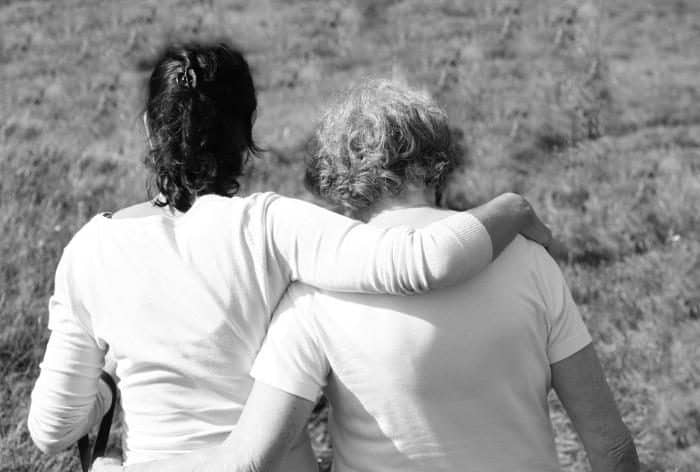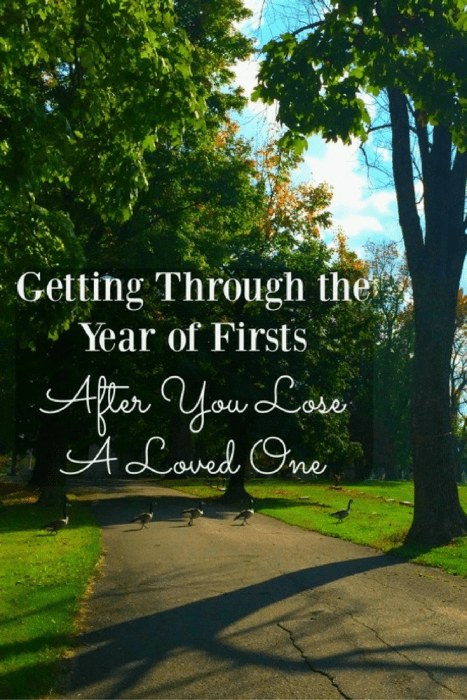Several years ago, I lost a younger cousin, an aunt, and a man who was like a grandfather to me. I thought about their families often as they were beginning to experience their year of firsts.
I know how painful that journey is and that it’s a year you have to walk through… whether you are ready or not.
I lost my brother as a middle schooler and my mom as a young adult.
There will be birthdays, anniversaries, and holidays that they will now have to face without their loved one for the first time.
This makes previously joyous occasions something that can be dreaded because now they are filled with grieve and extra sadness.
It’s yet another reminder that they are not here.
Any time that you lose someone you love, it’s extremely hard, but the “year of firsts” is especially hard.

Moving on after the Funeral
For those closest to the one who died, the pain lasts long after the funeral, when it feels like everyone else has moved on with their life.
My mom’s birthday and Thanksgiving were in the same month that my mom died. My family and my dad ended up going away for Thanksgiving weekend that first year because it was too hard to stay home.
We needed to try to experience something fun for my son, who was a toddler at the time. We needed a sense of hope in the sadness. It was hard to get into decorating for Christmas that year too.
Over the years I have decorated more for Christmas using some of her favorite decorations that she would place out each year. I have special picture ornaments on our Christmas tree to honor her memory along with my brother’s.
Mother’s Day is another painful reminder of her absence. On that day, I observe all of the images on social media with daughters and sons celebrating their moms. It’s still a reminder of that stinging void.
There are so many moments that I wish she could have been here for… including meeting her other grandson.

So how do you get through the year of firsts without your loved one?
The answer is that it’s different for everyone.
You will have moments of sadness that will hit you at odd times, like when you see their handwriting, or while you are shopping or making dinner or when you hear a song that brings back a memory.
Crying is ok and good.
It’s also a necessary part of the process. I tend to cry when I’m alone. Sometimes you just need that release.
There are times you will be angry for moments that have been stolen from you. There are times when it’s hard to find meaning in anything. It can feel like a non-stop emotional roller coaster.
Sharing stories and memories is therapeutic during these times. People who also cared for your loved one can be life giving during this time because they understand your pain.
Faith.
Hope.
The only way I got through this tough time was because of my faith and the hope that I will see my loved ones again.
That doesn’t mean that I understand the why, because I don’t.
The death of a loved one is something that you never get over.
You just find new ways to live.

Recognize the Awkwardness Around Grief
People don’t know what to say so sometimes they say the wrong thing, or the awkward thing, or sometimes they don’t say anything at all… because they don’t want to make things more awkward.
I’ve personally experienced being on the receiving end all of these situations and it sucks.
Just know that most people have good intentions and aren’t trying to cause more pain.
In social settings, recognize that showing up for special events and gatherings is HUGE.
Sometimes the grieving person feels like they have to hide their sadness so that others don’t feel bad.
There may be moments when the person grieving needs to leave the room or leave an event early because of feeling emotionally overwhelmed.
Acknowledge their pain and bravery for showing up.

How Can You Support Someone Who Lost a Loved One?
Recognize and acknowledge their pain.
Send them a text or call them on their loved one’s birthday. Be mindful of special holidays/ occasions where the absence of their loved one will be even more noticeable.
Help lighten their load with acts of service around their house or with meals.
When someone is grieving, they typically won’t ask for help, but they will appreciate proactive gestures.
Let them know that you are there to talk… or not talk if they just want some moments that feel a little more “normal.”
When they want to talk, ask them to share some of their favorite memories. Ask about the things their loved one did that made them laugh.
The longer time goes by there are different waves of grief and small moments or items can trigger memories years later.
There is no timeline for getting over loving a loved one. Each person has to walk through and process the pain in their own timing as they find a new way to live.
Other Related Articles About Grief
Why Death Has Made Me Want To Live
A Great Self Care Gift for Someone Who Has Lost a Loved One
How to Create Meaningful Conversations with Your Loved Ones


